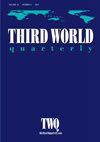The struggle for water in rural Paraguay: a ‘perverse confluence’ analysis of subversive participation
IF 1.8
2区 经济学
Q2 DEVELOPMENT STUDIES
引用次数: 0
Abstract
Abstract In March 1999, the people of Paraguay found themselves at an historical crossroads. At the national level and in rural communities, the legacy of the 35-year Stroessner dictatorship continued to limit the ability of democratic actors to make social and political change in the country. The old one-party rule of the Colorados confronted by international and local pressure for transformation, led to a political crisis that challenged both neoliberal development policies and the lingering authoritarian populism of the dictatorship. This essay explores a municipal infrastructure and water project sponsored by the Paraguayan government, the Peace Corps and the Inter-American Development Bank, in which the joint effort revealed tensions between emergent forms of democratisation and the goals of campesinos and their allies in the Catholic Church. Struggles for improved quality of life through infrastructure development intertwined with neoliberal modes of governance and efforts to overcome years of local authoritarian rule. Local communities sought a more active role in governing their affairs, which led to the successful implementation of Juntas de Saneamiento or ‘sanitation councils’.巴拉圭农村的水资源争夺战:颠覆性参与的“反常汇合”分析
摘要1999年3月,巴拉圭人民发现自己处于历史的十字路口。在国家一级和农村社区,35年的斯特罗斯纳独裁统治的遗留问题继续限制民主行为者在国家进行社会和政治变革的能力。科罗拉多人的旧一党统治面临着国际和地方的转型压力,导致了一场政治危机,既挑战了新自由主义的发展政策,也挑战了独裁时期挥之不去的威权民粹主义。本文探讨了巴拉圭政府、和平队和美洲开发银行赞助的一个市政基础设施和供水项目,在该项目中,联合努力揭示了新兴形式的民主化与坎佩西诺人及其天主教盟友的目标之间的紧张关系。通过基础设施发展与新自由主义治理模式以及克服多年地方独裁统治的努力相互交织,努力提高生活质量。当地社区寻求在管理其事务中发挥更积极的作用,这导致了Juntas de Saneamiento或“卫生委员会”的成功实施。
本文章由计算机程序翻译,如有差异,请以英文原文为准。
求助全文
约1分钟内获得全文
求助全文
来源期刊

Third World Quarterly
DEVELOPMENT STUDIES-
CiteScore
4.10
自引率
15.00%
发文量
137
期刊介绍:
Third World Quarterly ( TWQ ) is the leading journal of scholarship and policy in the field of international studies. For almost four decades it has set the agenda of the global debate on development discourses. As the most influential academic journal covering the emerging worlds, TWQ is at the forefront of analysis and commentary on fundamental issues of global concern. TWQ examines all the issues that affect the many Third Worlds and is not averse to publishing provocative and exploratory articles, especially if they have the merit of opening up emerging areas of research that have not been given sufficient attention. TWQ is a peer-reviewed journal that looks beyond strict "development studies", providing an alternative and over-arching reflective analysis of micro-economic and grassroot efforts of development practitioners and planners. It furnishes expert insight into crucial issues before they impinge upon global media attention. TWQ acts as an almanac linking the academic terrains of the various contemporary area studies - African, Asian, Latin American and Middle Eastern - in an interdisciplinary manner with the publication of informative, innovative and investigative articles. Contributions are rigorously assessed by regional experts.
 求助内容:
求助内容: 应助结果提醒方式:
应助结果提醒方式:


